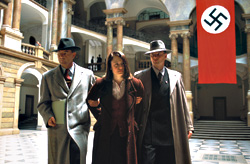One of the generally weak foreign-language nominees at the Oscars, this dramatization of the arrest and trial of an anti-Nazi dissident during World War II draws on “court” records discovered in the former East Germany since The White Rose addressed the same topic in 1982. But fresh transcripts do not fresh movies make. The Nazi court is obviously a kangaroo court, and Sophie (Julia Jentsch) and her small, brave band of fellow students are inevitably convicted and executed. There is no drama, no surprise, and the interrogation scenes include, yes, a light being shined in Sophie’s devoutly Christian eyes. Much is made by her dolorous prosecutor (Alexander Held) of incriminating postage rates and railroad schedules— postage! schedules!—to verify that she and her brother did, in fact, distribute anti-Hitler leaflets at their Munich university.
Off with her head, already. The material might work onstage, where two breathing actors could enliven the transcripts of the dead, but German cinema has moved beyond the need for any more such tedious self-flagellation. Sophie was good and the Nazis were evil. The movie is only alarming in its embrace of Protestant martyrdom at a time when we’re trying to get the Muslim world to, you know, abandon such uncivilized notions. Led from court, she tells the judge, “You will still stand where I am standing.” True, but that doesn’t mean we have to sit through this.








